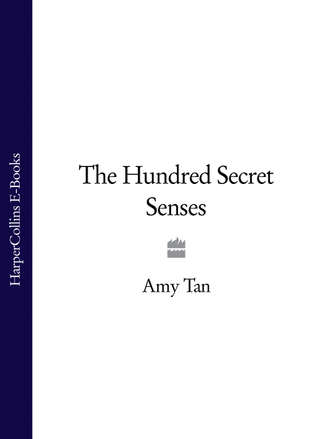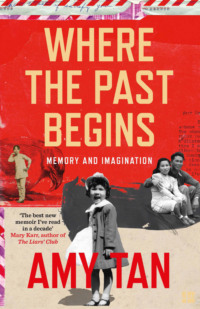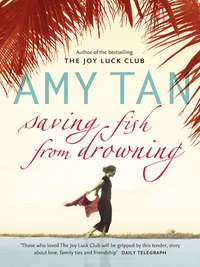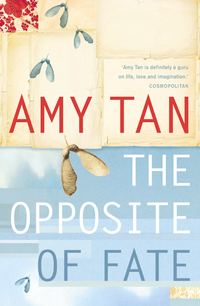
Полная версия
The Hundred Secret Senses
What should we learn as human beings?
Why should we help others less fortunate than ourselves?
How can we prevent wars?
I also figured I’d learn what happened to certain things that were lost, such as Barbie’s feather boa and, more recently, my rhinestone necklace, which I suspected my brother Tommy had filched, even though he said, ‘I didn’t take it, swear to God.’ What’s more, I wanted to look up the answers to a few unsolved mysteries, like: Did Lizzie Borden kill her parents? Who was the Man in the Iron Mask? What really happened to Amelia Earhart? And out of all the people on death row who had been executed, who was actually guilty and who was innocent? For that matter, which felt worst, being hanged, gassed, or electrocuted? In between all these questions, I’d find the proof that it was my father who told the truth about how Kwan’s mother died, not Kwan.
By the time I went to college, I didn’t believe in heaven and hell anymore, none of those metaphors for reward and punishment based on absolute good and evil. I had met Simon by then. He and I would get stoned with our friends and talk about the afterlife: ‘It just doesn’t make sense, man – I mean, you live for less than a hundred years, then everything’s added up and, boom, you go on for billions of years after that, either lying on the proverbial beach or roasting on a spit like a hot dog.’ And we couldn’t buy the logic that Jesus was the only way. That meant that Buddhists and Hindus and Jews and Africans who had never even heard of Christ Almighty were doomed to hell, while Ku Klux Klan members were not. Between tokes, we’d speak while trying not to exhale: ‘Wow, what’s the point in that kind of justice? Like, what does the universe learn after that?’
Most of our friends believed there was nothing after death – lights out, no pain, no reward, no punishment. One guy, Dave, said immortality lasted only as long as people remembered you. Plato, Confucius, Buddha, Jesus – they were immortal, he said. He said this after Simon and I attended a memorial service for a friend, Eric, whose number came up in the draft and who was killed in Vietnam.
‘Even if they weren’t really the way they’re now remembered?’ Simon asked.
Dave paused, then said, ‘Yeah.’
‘What about Eric?’ I asked. ‘If people remember Hitler longer than Eric, does that mean Hitler is immortal but Eric isn’t?’
Dave paused again. But before he could answer, Simon said firmly, ‘Eric was great. Nobody will ever forget Eric. And if there’s a paradise, that’s where he is right now.’ I remember I loved Simon for saying that. Because that’s what I felt too.
How did those feelings disappear? Did they vanish like the feather boa, disappear when I wasn’t looking? Should I have tried harder to find them again?
It’s not just grudges that I hang on to. I remember a girl on my bed. I remember Eric. I remember the power of inviolable love. In my memory, I still have a place where I keep all those ghosts.
4 THE GHOST MERCHANT’S HOUSE
My mother has another new boyfriend, Jaime Jofré. I don’t have to meet him to know he’ll have charm, dark hair, and a green card. He’ll speak with an accent and my mother will later ask me, ‘Isn’t he passionate?’ To her, words are more ardent if a man must struggle to find them, if he says ‘amor’ with a trill rather than ordinary ‘love.’
Romantic though she is, my mother is a practical woman. She wants proof of love: Give and you should receive. A bouquet, ballroom dancing lessons, a promise of eternal fidelity it must be up to the man to decide. And there’s also Louise’s corollary of sacrificial love: Give up smoking for him and receive a week at a health spa. She prefers the Calistoga Mud Baths or the Sonoma Mission Inn. She thinks men who understand this kind of exchange are from emerging nations – she would never say ‘the third world.’ A colony under foreign dictatorship is excellent. When emerging nation isn’t available, she’ll settle for Ireland, India, Iran. She firmly believes that men who have suffered from oppression and a black-market economy know there’s more at stake. They try harder to win you over. They’re willing to deal. Through these guiding thoughts, my mother has found true love as many times as she’s quit smoking for good.
Hell yes, I’m furious with my mother. This morning she asked if she could drop by to cheer me up. And then she spent two hours comparing my failed marriage with hers to Bob. A lack of commitment, an unwillingness to make sacrifices, no give, all take – those are the common faults she’s noticed in Simon and Bob. And she and I both ‘gave, gave, gave from the bottom of our hearts.’ She bummed a cigarette from me, then a match.
‘I saw it coming,’ she said, and inhaled deeply. ‘Ten years ago. Remember that time Simon went to Hawaii and left you home when you had the flu?’
‘I told him to go. We had nonrefundable airline tickets and he could sell only one.’ Why was I defending him?
‘You were sick. He should have been giving you chicken soup rather than cavorting on the beach.’
‘He was cavorting with his grandmother. She’d had a stroke.’ I was starting to sound as whiny as a kid.
She gave me a sympathetic smile. ‘Sweetie, you don’t have to be in denial anymore. I know what you’re feeling. I’m your mother, remember?’ She stubbed out her cigarette before assuming her matter-of-fact, social worker manner: ‘Simon didn’t love you enough, because he was lacking, not you. You are abundantly lovable. There is nothing wrong with you.’
I gave a stiff nod. ‘Mom, I really should get to work now.’
‘You go right ahead. I’ll just have another cup of coffee.’ She looked at her watch and said, ‘The exterminators flea-bombed my apartment at ten. Just to be safe, I’d like to wait another hour before I go back.’
And now I’m sitting at my desk, unable to work, completely drained. What the hell does she know about my capacity for love? Does she have any idea how many times she’s hurt me without knowing it? She complains that all that time she spent with Bob was a big waste. What about me? What about the time she didn’t spend with me? Wasn’t that a waste too? And why am I now devoting any energy to thinking about this? I’ve been reduced to a snivelly little kid again. There I am, twelve years old, facedown on my twin bed, a corner of the pillow stuffed into my mouth so that Kwan can’t hear my mangled sobs.
‘Libby-ah,’ Kwan whispers, ‘something matter? You sick? Eat too much Christmas cookie? Next time I don’t make so sweet. … Libby-ah, you like my present? You don’t like, tell me, okay? I make you another sweater. You tell me what color. Knit it take me only one week. I finish, wrap up, like surprise all over again. … Libby-ah? I think Daddy Mommy come back from Yosemite Park bring you beautiful present, pictures too. Pretty snow, mountaintop … Don’t cry! No! No! You not mean this. How you can hate you own mother? … Oh? Daddy Bob too? Ah, zemma zaogao. …‘

Libby-ah, Libby-ah? Can I turn on the light? I want to show you something. …
Okay, okay! Don’t get mad! I’m sorry. I’m turning it off. See? It’s dark again. Go back to sleep. … I was going to show you the pen that fell out of Daddy Bob’s trouser pocket. … You tilt it one way, you see a lady in a blue dress. You tilt it the other way, wah! – the dress falls down. I’m not lying. See for yourself. I’ll turn on the light. Are you ready? … Oh, Libby-ah, your eyes are swollen big as plums! Put the wet towel back over them. Tomorrow they won’t itch as much. … The pen? I saw it sneaking out of his pocket when we were at Sunday mass. He didn’t notice because he was pretending to pray. I know it was just pretend, mm-hmm, because his head went this way – booomp! – and he was snoring. Nnnnnnnhhh! It’s true! I gave him a little push. He didn’t wake up, but his nose stopped making those sounds. Ah, you think that’s funny? Then why are you laughing?
So anyway, after a while I looked at the Christmas flowers, the candles, the colored glass. I watched the priest waving the smoky lantern. Suddenly I saw Jesus walking through the smoke! Yes, Jesus! I thought he had come to blow out his birthday candles. I told myself, Finally I can see him – now I am a Catholic! Oh, I was so excited. That’s why Daddy Bob woke up and pushed me down.
I kept smiling at Jesus, but then I realized – ah? – that man was not Jesus but my old friend Lao Lu! He was pointing and laughing at me. ‘Fooled you,’ he said, ‘I’m not Jesus! Hey, you think he has a bald head like mine?’ Lao Lu walked over to me. He waved his hand in front of Daddy Bob. Nothing happened. He touched his little finger light as a fly on Daddy Bob’s forehead. Daddy Bob slapped himself. He slowly pulled the nasty pen from Daddy Bob’s pocket and rolled it into a fold of my skirt.
‘Hey,’ Lao Lu said. ‘Why are you still going to a foreigners’ church? You think a callus on your butt will help you see Jesus?’
Don’t laugh, Libby-ah. What Lao Lu said was not polite. I think he was remembering our last lifetime together, when he and I had to sit on the hard bench for two hours every Sunday. Every Sunday! Miss Banner too. We went to church for so many years and never saw God or Jesus, not Mary either, although back then it was not so important to see her. In those days, she was also mother to baby Jesus but only concubine to his father. Now everything is Mary this and that! – Old St. Mary’s, Mary’s Help, Mary Mother of God, forgiving me my sins. I’m glad she got a promotion. But as I said, in those days, the Jesus Worshippers did not talk about her so much. So I had to worry only about seeing God and Jesus. Every Sunday, the Jesus Worshippers asked me, ‘Do you believe?’ I had to say not yet. I wanted to say yes to be polite. But then I would have been lying, and when I died maybe they would come after me and make me pay two kinds of penalty to the foreign devil, one for not believing, another for pretending that I did. I thought I couldn’t see Jesus because I had Chinese eyes. Later I found out that Miss Banner never saw God or Jesus either. She told me she wasn’t a religious kind of person.
I said, ‘Why is that, Miss Banner?’
And she said, ‘I prayed to God to save my brothers. I prayed for him to spare my mother. I prayed that my father would come back to me. Religion teaches you that faith takes care of hope. All my hopes are gone, so why do I need faith anymore?’
‘Ai!’ I said. ‘This is too sad! You have no hopes?’
‘Very few,’ she answered. ‘And none that are worth a prayer.’
‘What about your sweetheart?’
She sighed. ‘I’ve decided he’s not worth a prayer either. He deserted me, you know. I wrote letters to an American navy officer in Shanghai. My sweetheart’s been there. He’s been in Canton. He’s even been in Guilin. He knows where I am. So why hasn’t he come?’
I was sad to hear that. At the time, I didn’t know her sweetheart was General Cape. ‘I still have many hopes of finding my family again,’ I said. ‘Maybe I should become a Jesus Worshipper.’
‘To be a true worshipper,’ she said, ‘you must give your whole body to Jesus.’
‘How much do you give?’
She held up her thumb. I was astonished, because every Sunday she preached the sermon. I thought this should be worth two legs at least. Of course, she had no choice about preaching. No one understood the other foreigners, and they couldn’t understand us. Their Chinese was so bad it sounded just like their English. Miss Banner had to serve as Pastor Amen’s go-between. Pastor Amen didn’t ask. He said she must do this, otherwise no room for her in the Ghost Merchant’s House.
So every Sunday morning, she and Pastor stood by the doorway to the church. He would cry in English, ‘Welcome, welcome!’ Miss Banner would translate into Chinese: ‘Hurry-come into God’s House! Eat rice after the meeting!’ God’s House was actually the Ghost Merchant’s family temple. It belonged to his dead ancestors and their gods. Lao Lu thought the foreigners showed very bad manners picking this place for God’s House. ‘Like a slap in the face,’ he said. ‘The God of War will drop horse manure from the sky, you wait and see.’ Lao Lu was that way – you make him mad, he’ll pay you back.
The missionaries always walked in first, Miss Banner second, then Lao Lu and I, as well as the other Chinese people who worked in the Ghost Merchant’s House – the cook, the two maids, the stableman, the carpenter, I forget who else. The visitors entered God’s House last. They were mostly beggars, a few Hakka God Worshippers, also an old woman who pressed her hands together and bowed three times to the altar, even though she was told over and over again not to do that anymore. The newcomers sat on the back benches – I’m guessing this was in case the Ghost Merchant came back and they needed to run away. Lao Lu and I had to sit up front with the missionaries, shouting ‘Amen!’ whenever the pastor raised his eyebrows. That’s why we called him Pastor Amen – also because his name sounded like ‘Amen,’ Hammond or Halliman, something like that.
As soon as we flattened our bottoms on those benches, we were not supposed to move. Mrs. Amen often jumped up, but only to wag her finger at those who made too much noise. That’s how we learned what was forbidden. No scratching your head for lice. No blowing your nose into your palm. No saying ‘Shit’ when clouds of mosquitoes sang in your ear – Lao Lu said that whenever anything disturbed his sleep.
That was another rule: No sleeping except when Pastor Amen prayed to God, long, boring prayers that made Lao Lu very happy. Because when the Jesus Worshippers closed their eyes, he could do the same and take a long nap. I kept my eye open. I would stare at Pastor Amen to see if God or Jesus was coming down from the heavens. I had seen this happen to a God Worshipper at a temple fair. God entered an ordinary man’s body and threw him to the ground. When he stood up again, he had great powers. Swords thrust against his stomach bent in half. But no such thing ever happened to Pastor Amen. Although one time when Pastor was praying, I saw a beggar standing at the door. I remembered that the Chinese gods sometimes did this, came disguised as beggars to see what was going on, who was being loyal, who was paying them respect. I wondered if the beggar was a god, now angry to see foreigners standing at the altar where he used to be. When I looked back a few minutes later, the beggar had disappeared. So who knows if he was the reason for the disasters that came five years later.
At the end of the prayer time, the sermon would begin. The first Sunday, Pastor Amen spoke for five minutes – talk, talk, talk! – a lot of sounds that only the other missionaries could understand. Then Miss Banner translated for five minutes. Warnings about the devil. Amen! Rules for going to heaven. Amen! Bring your friends with you. Amen! Back and forth they went, as if they were arguing. So boring! For two hours, we had to sit still, letting our bottoms and our brains grow numb.
At the end of the sermon, there was a little show, using the music box that belonged to Miss Banner. Everyone liked this part very much. The singing was not so good, but when the music started, we knew our suffering was almost at an end. Pastor Amen lifted both hands and told us to rise. Mrs. Amen walked to the front of the room. So did the nervous missionary named Lasher, like laoshu, ‘mouse,’ so that was what we called her, Miss Mouse. There was also a foreign doctor named Swan, which sounded like suan-le, ‘too late’ – no wonder sick people were scared to see him. Dr. Too Late was in charge of opening Miss Banner’s music box and winding it with a key. When the music started, the three of them sang. Mrs. Amen had tears pouring from her eyes. Some of the old country people asked out loud if the box contained tiny foreigners.
Miss Banner once told me the music box was a gift from her father, the only memory of her family that she had left. Inside, she kept a little album for writing down her thoughts. The music, she said, was actually a German song about drinking beer, dancing, and kissing pretty girls. But Mrs. Amen had written new words, which I heard a hundred times but only as sounds: ‘We’re marching with Jesus on two willing feet, when Death turns the corner, our Lord we shall meet.’ Something like that. You see, I remember that old song, but this time the words have new meaning. Anyway, that was the song we heard every week, telling everyone to go outside to eat a bowl of rice, a gift from Jesus. We had many beggars who thought Jesus was a landlord with many rice fields.
The second Sunday, Pastor Amen spoke for five minutes, Miss Banner for three. Then Pastor for another five minutes, Miss Banner for one. Everything became shorter and shorter on the Chinese side, and the flies drank from our sweat for only one and a half hours that Sunday. The week after that it was only one hour. Later, Pastor Amen had a long talk with Miss Banner. The following week, Pastor Amen spoke for five minutes, Miss Banner spoke the same amount. Again Pastor spoke for five minutes, Miss Banner the same amount. But now she didn’t talk about rules for going to heaven. She was saying, ‘Once upon a time, in a kingdom far away, there lived a giant and the filial daughter of a poor carpenter who was really a king. …’ At the end of each five minutes, she would stop at a very exciting part and say something like: ‘Now I must let Pastor speak for five minutes. But while you wait, ask yourself, Did the tiny princess die, or did she save the giant?’ After the sermon and story were over, she told people to shout ‘Amen’ if they were ready to eat their free bowl of rice. Ah, big shouts!
Those Sunday sermons became very popular. Many beggars came to hear Miss Banner’s stories from her childhood. The Jesus Worshippers were happy. The rice-eaters were happy. Miss Banner was happy. I was the only one who worried. What if Pastor Amen learned what she was doing? Would he beat her? Would the God Worshippers pour coals over my body for teaching a foreigner to have a disobedient Chinese tongue? Would Pastor Amen lose face and have to hang himself? Would the people who came for rice and stories and not Jesus go to a foreigners’ hell?
When I told Miss Banner my worries, she laughed and said no such thing would happen. I asked her how she knew this. She said, ‘If everyone is happy, what harm can follow?’ I remembered what the man who returned to Thistle Mountain had said: ‘Too much happiness always overflows into tears of sorrow.’
We had five years of happiness. Miss Banner and I became great and loyal friends. The other missionaries remained strangers to me. But from seeing little changes every day, I knew their secrets very well. Lao Lu told me about shameful things he saw from outside their windows, also strange things he saw when he was inside their rooms. How Miss Mouse cried over a locket holding a dead person’s hair. How Dr. Too Late ate opium pills for his stomachache. How Mrs. Amen hid pieces of Communion bread in her drawer, never eating it, just saving it for the end of the world. How Pastor Amen reported to America that he had made one hundred converts when really it was only one.
In return, I told Lao Lu some of the secrets I had seen myself. That Miss Mouse had feelings for Dr. Too Late, but he didn’t notice. That Dr. Too Late had strong feelings for Miss Banner, and she pretended not to notice. But I did not tell him that Miss Banner still had great feelings for her number-three sweetheart, a man named Wa-ren. Only I knew this.
For five years, everything was the same, except for these small changes. That was our life back then, a little hope, a little change, a little secret.
And yes, I had my secrets too. My first secret was this. One night, I dreamed I saw Jesus, a foreign man with long hair, long beard, many followers. I told Miss Banner, except I forgot to mention the part about the dream. So she told Pastor Amen, and he put me down for a hundred converts – that’s why I knew it was only one. I didn’t tell Miss Banner to correct him. Then he would have been more ashamed that his hundred converts was not even one.
My second secret was much worse.
This happened soon after Miss Banner told me she had lost her family and her hopes. I said I had so much hope I could use my leftovers to wish her sweetheart would change his mind and return. This pleased her very much. So that’s what I prayed for, for at least one hundred days.
One evening, I was sitting on a stool in Miss Banner’s room. We were talking, talking, talking. When we ran out of the usual complaints, I asked if we could play the music box. Yes, yes, she said. I opened the box. No key. It’s in the drawer, she said. Ah! What’s this? I picked up an ivory carving and held it to my eye. It was in the shape of a naked lady. Very unusual. I remembered seeing something like it once. I asked her where the little statue had come from.
‘It belonged to my sweetheart,’ she said. ‘The handle of his walking stick. When it broke off, he gave it to me as a remembrance. ‘
Wah! That’s when I knew Miss Banner’s sweetheart was the traitor. General Cape. All this time, I had been praying for him to come back. Just thinking about it shriveled my scalp.
So that was my second secret: that I knew who he was. And the third was this: I started praying he would stay away.
Let me tell you, Libby-ah, I didn’t know how much she hungered for love, any kind. Sweet love didn’t last, and it was too hard to find. But rotten love! – there was plenty to fill the hollow. So that’s what she grew accustomed to, that’s what she took as soon as it came back.
5 LAUNDRY DAY
Just like clockwork, the phone rings at eight. That makes it the third morning in a row Kwan’s called at the exact moment that I’m buttering toast. Before I can say hello, she blurts out: ‘Libby-ah, ask Simon – name of stereo fix-it store, what is?’
‘What’s wrong with your stereo?’
‘Wrong? Ahhhh … too much noise. Yes-yes, I play radio, it go cccahhhhhhhssss.’
‘Did you try adjusting the frequency?’
‘Yes-yes! I often adjust.’
‘How about standing back from the stereo? Maybe you’re conducting a lot of static today. It’s supposed to rain.’
‘Okay-okay, maybe try that first. But just case, you call Simon, ask him store name.’
I’m in a good mood. I want to see how far she’ll carry her ruse. ‘I know the store,’ I say, and search for a likely-sounding name. ‘Yeah, it’s Bogus Boomboxes. On Market Street.’ I can practically hear Kwan’s mind whirring and clicking into alternate mode.
Finally she laughs and says, ‘Hey, you bad girl – lie! No such name.’
‘And no such stereo problem,’ I add.
‘Okay-okay. You call Simon, tell him Kwan say Happy Birthday.’
‘Actually, I was going to call him for the same reason.’
‘Oh, you so bad! Why you torture me, embarrass this way!’ She lets out a wheezy laugh, then gasps and says, ‘Oh, and Libby-ah, after call Simon, call Ma.’
‘Why? Is her stereo broken too?’
‘Don’t joke. Her heart feel bad.’
I’m alarmed. ‘What’s wrong? Is it serious?’
‘Mm-hmm. So sad. You remember new boyfriend she have, I May Hopfree?’
‘High-may ho-fray,’ I pronounce slowly. ‘Jaime Jofré.’
‘I always remember, I May Hopfree. And that’s what he do! Turn out he married already. Chile lady. She show up, pinch his ear, take home.’
‘No!’ A ripple of glee flows into my cheeks, and I mentally slap myself.
‘Yes-yes, Ma so mad! Last week she buy two loveboat cruise ticket. Hopfree say use your Visa, I pay you back. Now no pay, no cruise, no refund. Ah! Poor Ma, always find wrong man. … Hey, maybe I do matchmake for her. I choose better for her than she choose herself. I make good match, bring me luck.’
‘What if it’s not so good?’
‘Then I must fix, make better. My duty.’
After we hang up, I think about Kwan’s duty. No wonder she sees my impending divorce as a personal and professional failure on her part. She still believes she was our spiritual mei-po, our cosmic matchmaker. And I’m hardly in the position to tell her that she wasn’t. I was the one who asked her to convince Simon we were destined to be together, linked by the necessity of fate.






